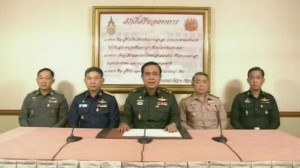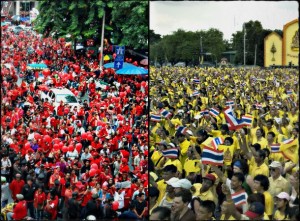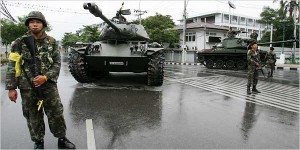Even a benign (i.e., popular and bloodless) military coup is not only inherently inconsistent but also politically untenable in a democracy. After all, no matter the extent of Thaksin’s corruption (highlighted by an insider’s deal where he allegedly sold his family’s stake in a state telecommunications company to Singaporeans for $1.9 billion), constitutional provisions were in place to either impeach him or vote him out of office at elections that were due within months.
Of course, given that, throughout their 74-year democracy, Thais have changed their government by coups as often as by elections, I suppose it’s no surprise that even former Prime Minister Chuan Leekpai seems resigned to military coups as an oxymoronic staple of Thai democracy…
Even though martial law has been declared, it’s reasonable to expect that democracy will soon be restored and all will be well in Thailand … until the next military coup….
(“Thailand’s Benign Military Coup…,” The iPINIONS Journal, September 20, 2006)
 Given the above, I’m sure you’ll forgive me for dismissing today’s military coup as little more than a Groundhog-Day event:
Given the above, I’m sure you’ll forgive me for dismissing today’s military coup as little more than a Groundhog-Day event:
Thailand’s military has announced it is taking control of the government and has suspended the constitution. In a TV statement, army chief Gen Prayuth Chan-ocha vowed to restore order and enact political reforms…
The coup follows months of political turmoil in Thailand.
(BBC, May 22, 2014)
 Accordingly, I refer you to “Thailand’s Never-Ending Asian Spring,” December 2, 2013. Because in it I delineated the untenable state of affairs that, for years, have had the country’s two main political factions paralyzing government functions – with Yellow Shirts invariably resorting to street protests to wrest political power from democratically elected Red Shirts.
Accordingly, I refer you to “Thailand’s Never-Ending Asian Spring,” December 2, 2013. Because in it I delineated the untenable state of affairs that, for years, have had the country’s two main political factions paralyzing government functions – with Yellow Shirts invariably resorting to street protests to wrest political power from democratically elected Red Shirts.
Having said that, I can hardly blame Thailand’s military for feeling even more emboldened these days given the foreboding, if not sanctioning, precedent the Egyptian military set:
I find it curious that Obama is effectively calling on the Egyptian military to guarantee the protesters’ democratic aspirations. Ironically, he and other Western leaders seem to believe that the best way to transition from Mubarak’s dictatorship to democracy is by installing a de facto military dictatorship.
The problem, however, is that in almost every case where this strategy has been deployed (e.g. in Pakistan and Burma) the military ends up overstaying its welcome … by years, if not decades.
(“Crisis in Egypt: the End Game,” The iPINIONS Journal, February 4, 2011)
 I felt compelled to comment just months ago, in “Egypt’s Arab Spring Spawns Brutal Military Dictatorship,” March 25, 2014, on the grave consequences of governing by street protests or military coups, which are still playing out in Egypt.
I felt compelled to comment just months ago, in “Egypt’s Arab Spring Spawns Brutal Military Dictatorship,” March 25, 2014, on the grave consequences of governing by street protests or military coups, which are still playing out in Egypt.
More to the point, notwithstanding public protestations, President Obama and other Western leaders supported Egypt’s army chief, General Abdel Fattah al-Sisi, when he mounted his military coup against his country’s democratically elected government. Therefore, Thailand’s army chief can be forgiven for thinking that they will support him too – no matter how dismayingly.
And so the chickens continue coming home to roost.
Related commentaries:
Thailand’s benign military coup
Thailand’s never-ending…
Egypt’s Arab spring…